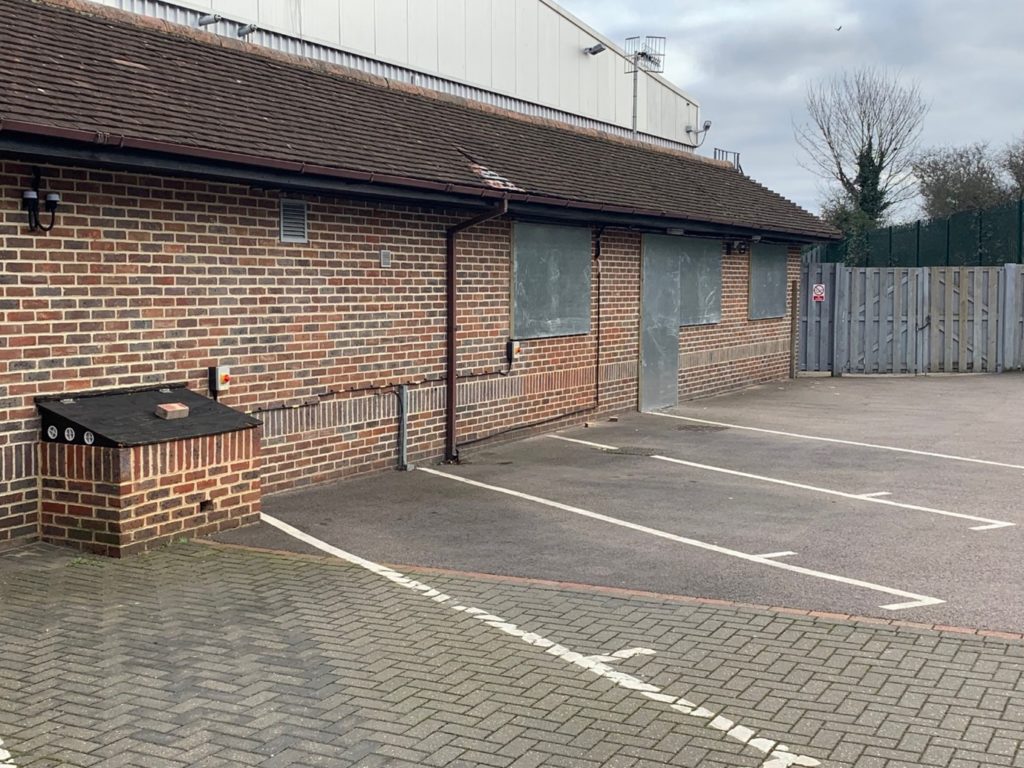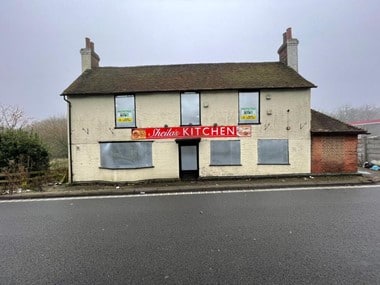Owning or managing a property that’s become vacant isn’t without its challenges. And when that property remains empty for an extended period of time, you will have to give thought to its security.
One of the first considerations is how you’ll secure your building’s entry points from the threat of vandals, thieves and squatters. And one of the common ways to achieve this is by ‘boarding up’ your windows and doors.
The term ‘Boarding up’ refers to the procedure of utilising plywood or steel sheets to cover a building’s openings, such as windows, doors, and skylights, mitigating the threat of your property becoming a playground for criminals.
In this blog, we consider the reasons why you should board up your vacant property.

Boarding Up Vacant Property: Steel Vs Wood

As mentioned, you can ‘board up’ your property with either wood or steel. Timber or wooden boarding is often used by temporary glazing companies because it is readily available and easy to install and, as a short-term solution, it is adequate. However, when the property is going to be empty for any length of time, steel is the favoured material due to its strength, its durability, its non-combustibility, and overall increased security credentials.
As anything other than a temporary repair, wood is an inferior boarding up method of providing empty property security. This is because it is normally affixed into place with Phillips-head screws – boards can be easily removed by anyone with the most basic set of tools (if they don’t succeed in kicking it in first!).
When compared to the specialist ‘anti-tamper fixings’ used to affix steel screens into place, there is no contest. The removal of these would require the use of the restricted access specialist tool – tools that are not available to the general public so are also not readily available to petty criminals, would find difficult to get hold of.
And let’s not forget the ongoing threat of arson in vacant properties. Wood, of course, is highly combustible and so timber window boarding becomes a potential on site fuel source, which actually aids arsonists in any fire setting attempts.
In an attempt to mitigate vacant property risks, your insurance company will likely insist on removal of all combustible materials inside the property and even within 10 metres of it outside. So, adding wood to the vulnerable windows really doesn’t help keep on the right side of them…
When all this is weighed up, the slightly higher upfront cost of steel screens is nothing compared to the cost of damage to your property, or more worrying if your commercial property becomes a target for squatters – particularly if you’re located in an area of high crime.
What Should Be Boarded Up?
The most visible entrances to your vacant property are the windows and doors, but when it comes to boarding up, it’s critical to consider all openings, even those that aren’t traditional entry points but could be used as such by thieves.
Entrances such as basements, skylights, and even delivery points like cellar access in pubs and bars are examples of these.
And openings of any size or shape can be boarded because steel security installers will measure each one and cut the steel to exactly fit, meaning there are no gaps around the edge that intruders could get a crowbar under to try to prise off.
Plus, any type of frame can be secured in steel, including uPVC, timber, crittall and aluminium, even very large glazed areas at shopfronts or showrooms can be secured and protected from unwanted intruders.
Avoid this common mistake when boarding up
To keep costs down, you may consider only boarding up your ground-floor entrances. This is a costly mistake best avoided, as there is nothing stopping someone from climbing up to your top floor to gain access.
Exposed window openings on your upper floors are often an invite, as it can encourage criminals to consider that you have overlooked the security, giving them an opportunity.
Very large buildings, or those previously used as schools, care homes etc might well have fire escapes, with metal stairs down to safety, but also stairs up to these doors for thieves, arsonists and squatters.
Windows above flat roofs are also susceptible, so consider them too and, it might sound obvious, but lock ladders away to prevent a readily available access to upper floor windows.
What About Doors?
Not many landlords will simply want to mothball and leave vacant property for long periods. They usually have a plan, possibly to develop, relet or sell. And for all of these reasons, they’ll need access for contractors, estate agents and potential buyers, plus any inspections that their insurance company insist on.
So, rather than trying to get in through a window (which will be hard as there will be steel on it!), fitting a steel security door is essential. These can fit any door opening size, from a standard front door to large glass showrooms. They’ll typically be fitted with insurance-standard deadlocks top and bottom to provide access only to who you want – not squatters, arsonists or thieves!
Boarding Up For Insurance Reasons
Landlords and managing agents must meet the criteria of their insurers, ensuring they are still protected whatever the circumstances, therefore boarding up is an important step in the process.

Most typical house insurance policies will not cover properties that have been vacant for more than 30 days, but it’s crucial to read your policy carefully because restrictions differ by provider.
When it becomes clear that your property will be empty for a lengthy period, you should comply with the Code of Practice for Unoccupied Buildings.
Property owners can take a variety of safeguards, including cutting off water and gas supply, cleaning rubbish, and closing letterboxes.
Why Commercial Property is at Risk from Squatters
Under British Law, squatting in a residential property is a criminal offence and therefore anyone found illegally inside can be arrested and charged.
However, the same cannot be said for non-residential properties since this protection doesn’t extend to commercial property!
When a squatter takes possession of a vacant commercial property, they are unlikely to even be investigated or challenged by the Police, because it’s a civil matter and not enforceable by the local Police.
This means that if your commercial property becomes a squat, your problems will become threefold:
- You will no longer have access to your property, which could be for a considerable length of time without rental income, putting your plans on hold and stopping agents marketing it for rent or sale.
- You will have to go through an extremely lengthy court process to legally evict them, which, at the moment due to Covid backlogs is about 6 months of a delay.
- Then when your property is successfully returned to you, you will be likely faced with some very large bills to repair the usual damage caused by squatters, clearance of all their types of waste and redecoration to reinstate it to its original condition.
Boarding Up With Steel Can Maximise Security
Although steel security is not always required for insurance purposes, it is becoming standard practice for many property owners to pay for it to further secure their property .
Despite the increased expenditures, when compared to the cost of removing squatters – which may cost more than £5,000 for legal fees alone – it can be money well spent to protect your property.
How Long Does Boarding Up Last?
Steel screens are designed to last the duration of your property being vacant. With plywood boards, longevity is a difficult prediction to make. The risk is just too great due to how easily they can get damaged.
When your property is no longer in need of protection, your security provider should ensure all steel screens are removed efficiently – to allow you to welcome new tenants or visitors to your property.
Additional Noteworthy Benefits of Steel Security Screens
Steel security doors – Doors can also be protected with steel security screens. They can be used on their own or in onjunction with steel security windows when complete boarding-up is required. Available in a variety of sizes, designed to protect existing doors and frames. Fixings are concealed internally.
Any size opening – Steel screens can be cut to a variety of size openings.
Fitting to any material type – Steel screens can be fitted to any material type (uPVC, crittal, timber or aluminium).
Perforated option – Steel screens are also available as perforated sheets. Ideal if you want to show visitors/clients/tenants around your property.
Conclusion
It’s clear to see why boarding up is a crucial step in securing your vacant property. But your results will differ largely – based on the material you choose. For peace of mind, steel is the best option, and one that could save you thousands in the long-run.
Other vacant property security options include wireless CCTV, concrete barriers and licenced security guards. When used holistically, these provide the responsiveness you need, relieving you of the stress of anti-social behaviour, arson, fly-tipping, trespassing and squatting.
If you’d like to find out more about boarding up, contact an expert today.








